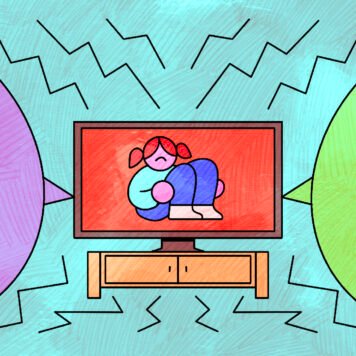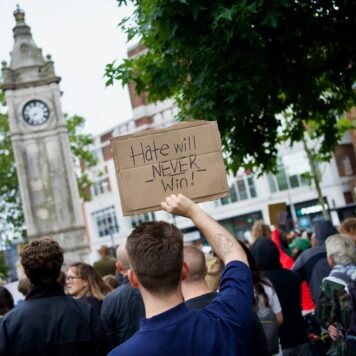Journalists at Reach plc titles, including the Mirror and the Express, are striking over pay and conditions. So, what role can worker power play in creating a healthier media landscape?
There’s something unusual and potentially seismic happening in the UK media space at the moment, not so much sprayed across its front pages as within its ranks.
Journalists tell the nation’s stories day in, day out, but they’re not immune to the biting realities behind them. Many of those reporting on the ‘low-paid workers ‘skipping meals amid cost of living crisis’, and the fact that ‘15 million people will face energy poverty in the New Year’, are facing such precarity themselves. And they’ve reached the limit of what they can live with.
At the end of August, over a thousand National Union of Journalists (NUJ) members at Reach plc, which owns 130+ titles across the UK, including nationals the Mirror and the Express, downed tools after ruling management’s offer of a 3% pay rise as insufficient. A further three days of strike action was scheduled for 14 to 16 September, but has been put on hold while the union ballots its members on a new pay offer floated by Reach in response.
Wage disparity and making the rich richer
The context of this is that a typical regional Reach reporter can expect to earn between £20-25k. Its London starting salary is £22k. Staff have recently spoken up about needing to use food banks to feed their families while in full-time employment.
This is partially because, following the digital revolution, news doesn’t make money like it used to, and organisations are still grappling with free-to-read content being the default. Reach is also still spending millions on settlements with victims of historic phone hacking at the Daily/Sunday Mirror and Sunday People. A company spokesperson refers to the slim pay increase being based on “a consistent agreement at the senior level to protect the future of the business”.
When what’s ‘fair’ is decided by the powerful
But make no mistake: it is also because these poor market conditions have exacerbated the concentration of media ownership, which has had consequences for remuneration. If you’re powerful in this landscape, you’re very powerful. And the powerful’s idea of what is fair has been widely accepted; as, in fact, have its ideas about lots of things.
Reach’s CEO, Jim Mullen, earns 104 times more than his median employee. These employees’ decision to strike is tied to a particular pay dispute, yes, but it is also a step towards challenging those who define the status quo for media professionals.
As Reach employees shared their reasons for striking on pickets and in tweets and interviews, one point came up again and again: no one goes into journalism to become a millionaire.
As a young journalist, I know this; job insecurity, unpaid grafting and working for minimum wage are all occupational hazards. People put up with them, to the extent that they are able to – there’s a reason 80% of journalists come from professional or upper-class backgrounds – because working in the industry as it stands is not possible without some layer of privilege.
I can see the turmoil of a young Reach employee: staff jobs are like gold dust; the alternative is a well-documented cycle of pitching, writing and chasing invoices; why complain? But from the young journalists I know and follow, I also see a real desire to preserve what’s great about our press and challenge what isn’t – starting from behind the scenes.
The need for collective bargaining power
NUJ Reach national coordinator Chris Morley termed the decision to call a strike “an unfortunate landmark.” If it is successful, it really could be a landmark – on the road to reasserting the role of collective bargaining in the industry, as part of a mission to fix it.
Newsworkers’ ability to stand up for themselves hasn’t been the same since the actions of Rupert Murdoch in 1986-7. Murdoch’s global media empire makes Reach seem like a parish council magazine.
After the print unions called a strike at the start of 1986, all participants were immediately fired. It was revealed that he had secretly built and staffed another printing plant, meaning his old workers withdrawing their labour had little to no impact. They continued their strike for a year but – in a slice of industrial history as pivotal as the miners’ strike – it failed.
One result was the derecognition of unions (including the NUJ) across Murdoch titles. These include the Sun and Sunday Times and at that point included the News of the World. “Traditional Fleet Street disputes were traditionally resolved,” journalist and historian Greg Neale says in Wapping: the Workers’ Story, “There were no winners or losers. They were settlements.” But then the bosses sucked up all the power through a straw and what they did with it remained – remains – unchecked.
It’s hard not to see the silencing of the union voice as one reason for the proliferation of unlawful intelligence gathering (most famously, phone hacking) that soon followed. Likewise: the treatment of staff during Operation Elveden, after this law-breaking was discovered. In a breach of a core journalistic principle, stacks and stacks of details of News’ own journalists’ confidential sources were handed over to the police.
The decline of union membership
Fast-forward to now: questions about pay, conditions and ethics remain unanswered. And still, as Conrad Landin notes in his thoughtful Guardian comment piece on Reach, only 1 in 4 UK journalists are NUJ members. Can those that are – specifically those currently striking against another one of the three companies that control 80% of the UK media – change something this time?
There’s no denying that, overall, membership numbers are falling and the public image of unions sits somewhere between obtuse and irrelevant.
But, as Grace Blakeley wrote a few days ago in Tribune, “we are beginning to see a resurgence in labour movement organising with workers in key sectors up and down the country” organising within and across their industries. On top of this, there’s evidence to suggest that precariously employed journalists have been bucking the trend, organising and achieving results, for a while now.
Academics Nicole S. Cohen and Greig de Peuter outline and analyse part of this evidence in their 2020 book New Media Unions: Organising Digital Journalists. Their chief focus is the USA, where around 2,000 media professionals at publications including the Los Angeles Times, the New Yorker, VICE and Vox joined writers’ unions in the three year period leading up to 2020.
Subscribe to shado's weekly newsletter
Exclusive event news, job and creative opportunities, first access to tickets and – just in case you missed them – our picks of the week, from inside shado and out.

Cohen and de Peuter talk about how in recent years reporters have been seen either as “model subjects of neoliberalism – enterprising selves adept at individual coping strategies and self-exploitation or as victims of precarity.” They suggest recognising a third category, where journalists are “activists and agents of change”, citing various successes unionised workplaces have had of late. These include negotiating minimum salaries and diversity policies, alongside saving jobs and challenging pay discrimination.
Journalism’s commodification in modern capitalism
Right now, in the UK, negotiations are unfolding at Al Jazeera and the BBC. Preparations are underway for a ballot on a strike over pay at the former; at the latter, industrial action is being floated as a response to the proposed merging of BBC News and BBC World News. Success for Reach’s employees would act as a morale boost for everyone involved: proof that it is possible to ask for more and get it.
It would also force bigger questions to the forefront: about the value of journalism and how it can be protected outside of the profit motive. “Unionisation is just one strategy to address journalism’s hyper-commodification in contemporary capitalism,” write Cohen and de Peuter.
I don’t think it will work on its own. Even if there was a drastic uptick in membership, union focus is narrow; we need to be thinking on a macro scale, involving the state, the public, tech corporations and other stakeholders.
But, I think if they can bring the younger generation of journalists along with them, and embrace and account for the many pros digitalisation has had for news –union voices should be loud.
Good journalism is a public good and, as much as unions can help individuals fight for individual rights, they can step into a wider, guiding role: as an industry’s moral backbone and line of defence against unquestioned commercialisation.
They can reject the consequences of media concentration. They can table and lead the discussions we have to have. And in turn we can hear solutions from the bottom where we have always heard excuses from the top. Eventually, people will have to listen.
What can you do?
- Read Make Bosses Pay: Why We Need Unions by Eve Livingston
- Cultural Workers Organise is a research project exploring collective responses to precarity in the media. It’s compiled lots of resources, including this video on organising digital media.
- At this year’s Media Democracy Festival, organised by the Media Reform Coalition, there was a panel discussion on ‘strengthening UK media unions’. You can watch it back here.
- Donate to the NUJ Reach strike hardship fund here.












